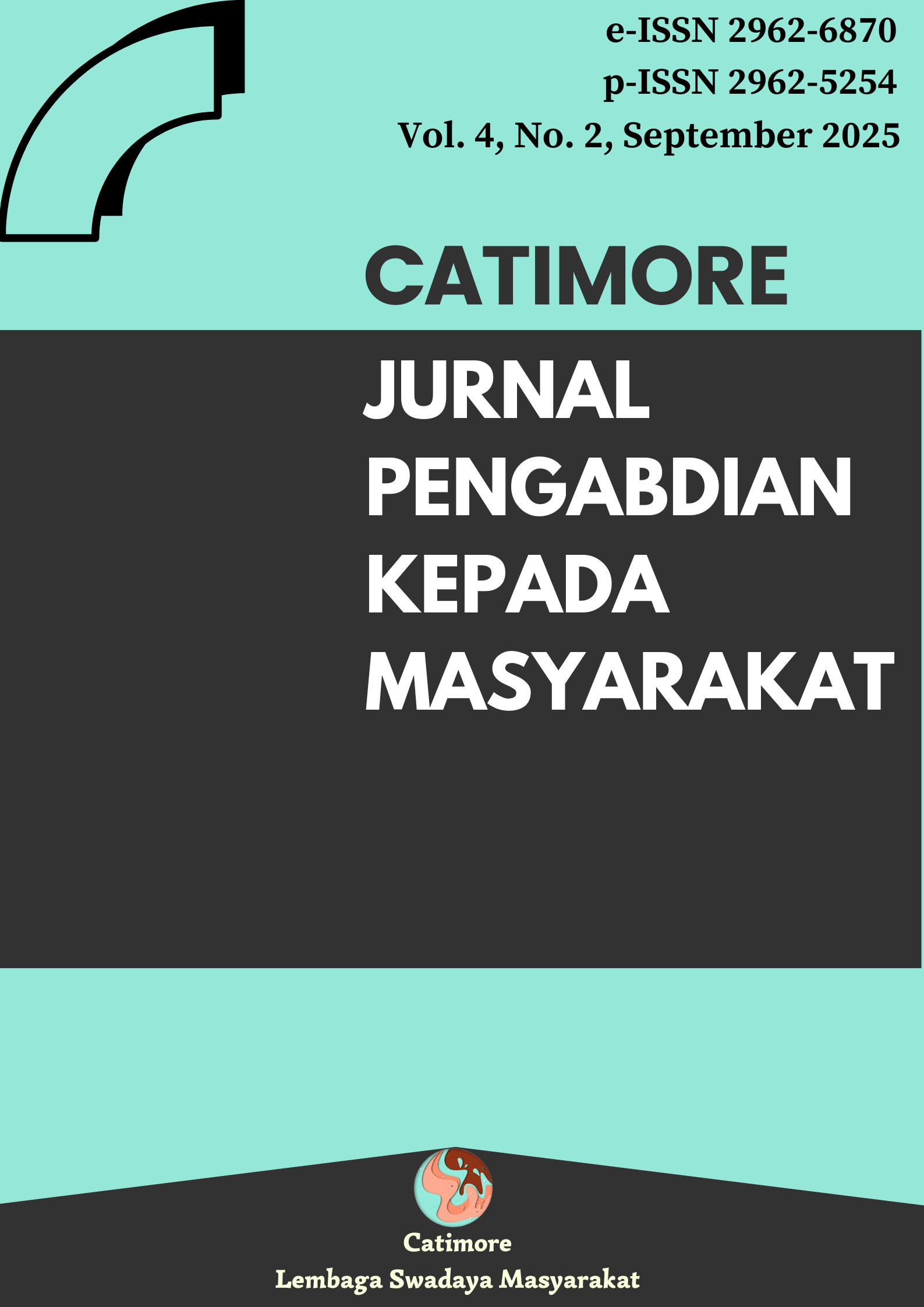Workshop Pemanfaatan Artificial Intelligence untuk Merancang Pembelajaran Mendalam sebagai Upaya Peningkatan Kompetensi Guru di YAPIP Cianjur
DOI:
https://doi.org/10.56921/cpkm.v4i2.328Keywords:
Artificial Intelligence, Deep Learning, Teacher Competence, Workshop, EducationAbstract
The rapid development of educational technology requires teachers to possess adaptive skills in designing learning processes that meet the demands of the 21st century. Teachers at Yayasan Pendidikan Islam Pacet (YAPIP) in Cianjur face challenges in understanding and implementing deep learning approaches, which consist of mindful learning, meaningful learning, and joyful learning, as well as in utilizing Artificial Intelligence (AI) as an educational innovation. This community service program aimed to enhance teachers’ competencies through a workshop focused on integrating AI into the design of deep learning-based instruction. The method included four stages: planning, implementation, evaluation, and reflection, involving 28 teachers from elementary and junior high school levels. The results indicated improvements in teachers’ knowledge, skills, and attitudes toward AI integration, demonstrated by innovative lesson designs, group presentations, and reflective discussions. Evaluation revealed that more than 80% of participants reported increased confidence in applying AI to their teaching practice. Challenges included limited digital infrastructure and variations in teachers’ technological literacy. Nevertheless, the workshop proved to be an effective alternative solution for supporting curriculum implementation and strengthening teacher professionalism. The outputs included lesson plans, scientific publications, media articles, and recommendations for program sustainability. Thus, this activity is expected to serve as a replicable model for other schools to improve the quality of technology-based education in regions with low Human Development Index (HDI).
References
Arvind, T. (2024). Leveraging Technology for Enhanced Connectedness and Student Engagement (hlm. 233–258). https://doi.org/10.4018/979-8-3693-7989-9.ch013
Ausubel, D. P. (2000). The Nature of Meaning and Meaningful Learning. Dalam The Acquisition and Retention of Knowledge: A Cognitive View (hlm. 67–100). Springer Netherlands. https://doi.org/10.1007/978-94-015-9454-7_4
Babajide Tolulope Familoni, & Nneamaka Chisom Onyebuchi. (2024). ADVANCEMENTS AND CHALLENGES IN AI INTEGRATION FOR TECHNICAL LITERACY: A SYSTEMATIC REVIEW. Engineering Science & Technology Journal, 5(4), 1415–1430. https://doi.org/10.51594/estj.v5i4.1042
Badan Pusat Statistik Kabupaten Cianjur. (2024). Komponen IPM menurut Kabupaten Cianjur.
Barigai, A., & Heravdakar, L. (2024). Exploring the Dynamics of Learning Communities in Fostering Collaboration and Knowledge Exchange. Journal of Education Review Provision, 4(1), 6–10. https://doi.org/10.55885/jerp.v4i1.316
Bordunos, A. K., Miletich, M. P., & Volkova, N. V. (2024). Mindful Learning: Principles and Prospect of Use in Higher Education. Psychological Science and Education, 29(4), 16–30. https://doi.org/10.17759/pse.2024290402
Chakraborty, J., & Esposito, A. G. (2024). Adult Learners Self‐Derive New Knowledge through Integration of Novel Information and Prior Knowledge and Are more Successful with Reactivation. Mind, Brain, and Education, 18(3), 226–235. https://doi.org/10.1111/mbe.12409
Cheong, N. (2022). Enhancing Teaching on Engineering and Science Areas, by Integrating Practice and Theory. 2022 8th International Conference on Education and Training Technologies, 115–119. https://doi.org/10.1145/3535756.3535775
Duque, R. de C. S., Monteiro, R. R., Loureiro, V. J. S., Nascimento, I. J. B. M. F. do, Placido, R. L., Silva, C. J. da, &
Saraiva, M. do S. G. (2024). Training teachers to use technology: Artificial Intelligence (AI) and the new challenges facing education. Dalam Themes focused on interdisciplinarity and sustainable development worldwide V. 02. Seven Editora. https://doi.org/10.56238/sevened2024.003-019
Fei, V. L., & Hung, D. (2016). Teachers as Learning Designers: What Technology Has to Do with Learning. A View from Singapore. Educational Technology, 56(4).
Kholifah Al Marah Hafidzhoh, Nisa Nadia Madani, Zahra Aulia, & Dede Setiabudi. (2023). Belajar Bermakna (Meaningful Learning) Pada Pembelajaran Tematik. Student Scientific Creativity Journal, 1(1), 390–397. https://doi.org/10.55606/sscj-amik.v1i1.1142
Kourkouli, K. (2024). Unlocking in-depth forum discussion and perceived effectiveness: Teaching and social presence categories in online teacher communities. Teaching and Teacher Education, 146, 104630. https://doi.org/10.1016/j.tate.2024.104630
M. Elbashbishy, E. (2024). Deep Learning in Education. Sustainability Education Globe, 2(1), 15–21. https://doi.org/10.21608/seg.2024.269380.1000
Manalu, D. E., Sulistyawati, S., Wahid, W., Bahari, Y., & Warneri, W. (2023). Facing New Challenges: The Role of Teachers as Agents of Change in the 21st Century. International Journal of Multi Discipline Science (IJ-MDS), 7(1), 1. https://doi.org/10.26737/ij-mds.v7i1.5024
Maulana, A., & Wiyono, D. Y. (2025). Adaptive Material Design Supporting Personalized Education: Challenges and Opportunities. JOURNAL OF TECHNOLOGY, EDUCATION & TEACHING (J-TECH), 1(2), 86–89. https://doi.org/10.62734/jtech.v1i2.419
MoDastoni, D. A. (2023). Exploring methods to make AI decisions more transparent and understandable for humans. Advances in Engineering Innovation, 3(1), None-None. https://doi.org/10.54254/2977-3903/3/2023037
Niemi, H., & Liu, J. (2021). AI in learning. Journal of Pacific Rim Psychology, 15. https://doi.org/10.1177/18344909211038110
Nikitina, I., & Ishchenko, T. (2024). THE IMPACT OF AI ON TEACHERS: SUPPORT OR REPLACEMENT? Scientific Journal of Polonia University, 65(4), 93–99. https://doi.org/10.23856/6511
Osman, D. J., & Warner, J. R. (2020). Measuring teacher motivation: The missing link between professional development and practice. Teaching and Teacher Education, 92, 103064. https://doi.org/10.1016/j.tate.2020.103064
Radić-Bojanić, B. B., & Pop-Jovanov, D. M. (2018). WORKSHOPS IN EDUCATION: THEORETICAL AND PRACTICAL ISSUES. Методички видици, 9(9), 223. https://doi.org/10.19090/mv.2018.9.223-234
Reddy, P., Chaudhary, K., & Hussein, S. (2023). A digital literacy model to narrow the digital literacy skills gap. Heliyon, 9(4), e14878. https://doi.org/10.1016/j.heliyon.2023.e14878
Saxena, P., Saxena, V., Pandey, A., Prync Flato, U. A., & Shukla, K. (2023). Multiple Aspects of Artificial Intelligence. Book Saga Publications. https://doi.org/10.60148/muasartificialintelligence
Schiff, D. S., & Rosenberg-Kima, R. B. (2023). AI in education: landscape, vision and critical ethical challenges in the 21st century. Dalam Handbook of Critical Studies of Artificial Intelligence (hlm. 804–814). Edward Elgar Publishing. https://doi.org/10.4337/9781803928562.00081
Vargas-Hernández, J. G., & Vargas-González, O. C. (2022). Strategies for meaningful learning in higher education. Journal of Research in Instructional, 2(1), 47–64. https://doi.org/10.30862/jri.v2i1.41
Zhou, Q., Guan, E., Yan, Y., Cui, G., & Wang, S. (2024). Practices of Teaching Competency Development. Dalam Handbook of Teaching Competency Development in Higher Education (hlm. 127–154). Springer Nature Singapore. https://doi.org/10.1007/978-981-99-6273-0_5
Downloads
Published
How to Cite
Issue
Section
License
Copyright (c) 2025 Jainuddin Jainuddin, Zea Zisman Usman, Rira Jun Fineldi, Puji Nurfauziah, Ika Wahyu Anita, Fitriana Yolanda, Aulia Sthephani, Teddy Alfra Siagian, Al Jupri, Eyus Sudihartinih

This work is licensed under a Creative Commons Attribution-ShareAlike 4.0 International License.















